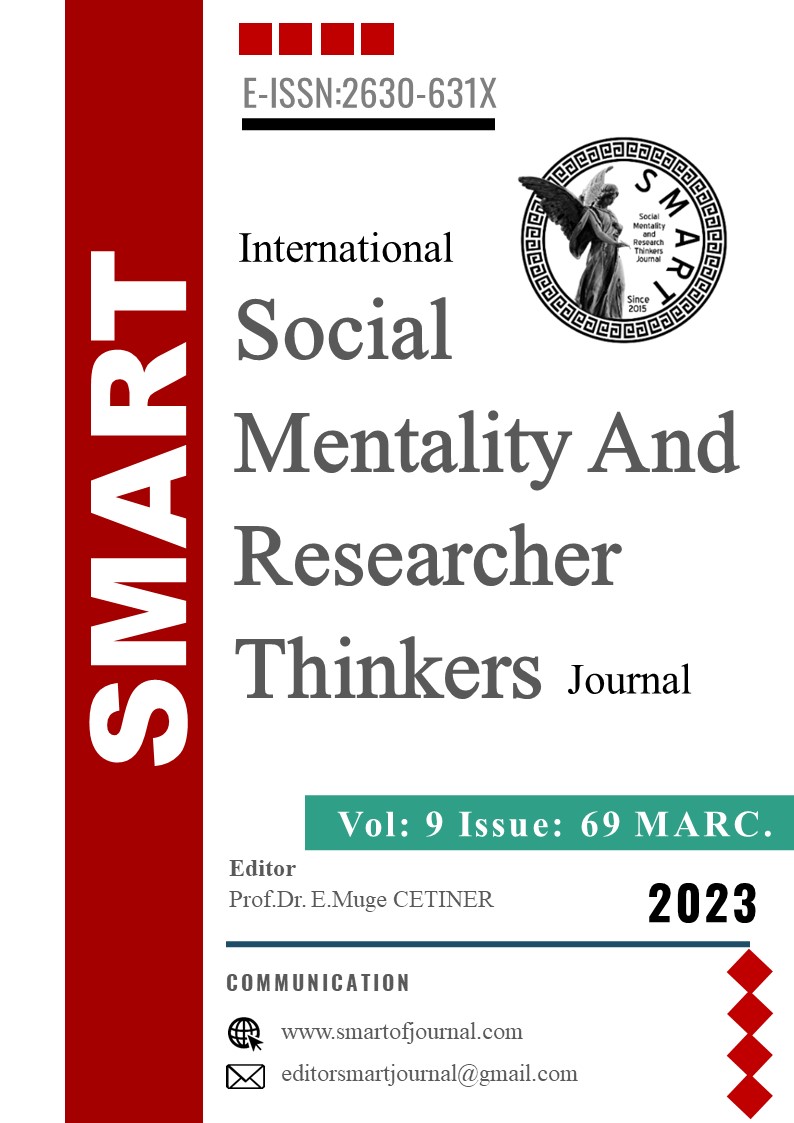Author :
Abstract
Yakın dönem Türk Tiyatrosu oyun yazarlığının önemli isimlerinden olan Özen Yula’nın pek çok oyununda olduğu gibi Gözü Kara Alaturka adlı oyunu da postmodern dönem insanının varlık sorununu döneme uygun araçlar kullanarak tartışmaktadır. Yazarın İstanbul üçlemesinin bir ayağını oluşturan oyun Harbiye semtinde 12 Eylül sonrasında geçmektedir. Yerel kodlar taşısa da evrensele uzanan derin mesajlar taşıyan oyun, takip etme, gözetleme, rol değişimi, tek tipleşme, aydın şizofrenisi, düşündürülmeme, düşünememe, toplumsal kirlilik, suça eğilim, değerlerin yok oluşu ve geçmişe özlem gibi konuları ele alır. Oyunda zaman, mekân kurguları ve bunların oyun kişileri ile olan etkileşimleri de ayrıca anlatım aracı olarak hizmet eder. Gözü Kara Alaturka’nın oyun kişileri de yazarın pek çok oyununda olduğu gibi değişim, dönüşüm geçirmezler. İçinde bulundukları belirsiz ve kaygan durumdan çıkmak için kendi kendilerine yetemezler. Bu tekinsiz, tehlikelerle dolu ve gelip geçici ilişkiler yumağını çözmek üzere bir çaba da göstermezler. Dolayısıyla yazarın dramatik tasarımı da yerleşik dramatik yapılarda görmeye alışkın olduğumuz gibi ilerlemez. Yani oyun kişilerinin içinde savruldukları durumlar, çözüme kavuşmak üzere boyut kazanan çatışmalar doğurmazlar. Bu oyun kişileri için değişim ancak ölüm yoluyla sağlanır. Postmodern yazının karakteristiklerinden olan gerçek ile kurgulanmış olanın somut ile soyut olanın birbirine karıştığı, kişileştirmenin her bir üyesinde olduğu gibi tasarımın tamamında da bütünlüksüz yapılar dikkat çeker. Modern sonrası bireyin bütünlüksüz yapısı, ayrıca bazı dinsel motiflere göndermeler yapılarak da sergilenir. Yine postmodern yazında sıklıkla karşılaştığımız metinler arası ilişki bu oyunda da kurulmuştur.
Keywords
Abstract
Özen Yula, who is one of the important names of the Turkish Theater playwrights in the recent period, as in many plays, also discusses the existence problem of the postmodern period man by using tools suitable for the period. The play, which forms one part of the author's Istanbul trilogy, takes place in the Harbiye district after September 12. Although it has local codes, the play, which carries deep messages reaching to the universal, deals with subjects such as following, surveillance, role change, standardization, intellectual schizophrenia, not being thoughtful, inability to think, social pollution, tendency to crime, disappearance of values and nostalgia. In the play, time, space fictions and their interactions with the play characters also serve as a means of expression. The characters of the play of the Gözü Kara Alaturka, like many of the author's plays, do not undergo change or transformation. They are not self-sufficient to get out of the uncertain and slippery situation they are in. Nor do they make an effort to unravel this uncanny, dangerous and transitory tangle of relationships. Therefore, the author's dramatic design does not progress as we are accustomed to seeing in established dramatic structures. In other words, the situations in which the characters of the play are thrown do not give rise to conflicts that gain dimensions to be resolved. For these play characters, change is only possible through death. As in each member of the personification, where the real and the fictionalized, the concrete and the abstract, which is one of the characteristics of postmodern writing, are mixed together, incomplete structures draw attention in the whole design. The disintegrated structure of the post-modern individual is also exhibited by making references to some religious motifs. Again, the intertextual relationship that we encounter frequently in postmodern literature is also established in this play.





